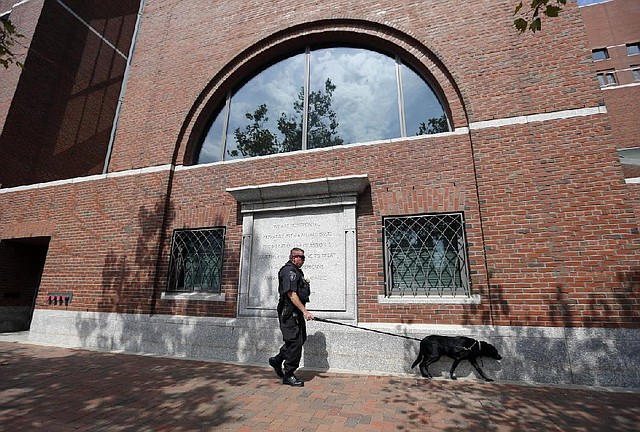The nation in brief
A police officer and his canine partner patrol outside federal court in Boston, Thursday, Aug. 21, 2014. A college friend of Boston Marathon bombing suspect Dzhokhar Tsarnaev pleaded guilty Thursday of impeding the investigation into the deadly attack. Dias Kadyrbayev, 20, is accused of removing a backpack containing emptied-out fireworks from Tsarnaev's dorm room after realizing he was suspected of carrying out the 2013 attack with his brother, Tamerlan Tsarnaev. (AP Photo/Elise Amendola)
Friday, August 22, 2014
Tsarnaev friend admits taking evidence
BOSTON -- A college friend of Boston Marathon bombing suspect Dzhokhar Tsarnaev pleaded guilty Thursday to impeding the investigation by removing incriminating evidence from Tsarnaev's dorm room several days after the deadly attack.
Dias Kadyrbayev, 20, admitted in federal court that he removed Tsarnaev's laptop computer and a backpack containing fireworks that had been emptied of their explosive powder from Tsarnaev's room at the University of Massachusetts-Dartmouth.
Twin bombs placed near the finish line of the 2013 marathon killed three people and injured more than 260.
Under a plea agreement, federal prosecutors said they would ask for no more than seven years in prison. The agreement allows his lawyer to argue for a lesser sentence. Kadyrbayev also agreed not to fight deportation after he completes his prison sentence.
U.S. District Judge Douglas Woodlock set sentencing for Nov. 18 but did not immediately accept the plea agreement, saying he first wanted to review a report that will be prepared by the probation department.
New rule clamps down on hydrocodone
WASHINGTON -- The federal government on Thursday tightened the prescribing rule for the most common form of painkiller in the country, the final step in a policy shift that has been years in the making.
The stricter rule for hydrocodone, which includes drugs like Vicodin and is the most widely prescribed painkiller in the United States, is one of the most far-reaching efforts to stop the growing epidemic of prescription-drug abuse, which takes the lives of more than 20,000 Americans every year according to federal data.
The rule places hydrocodone in a tougher, more restrictive category, and the changes it requires are sweeping. Doctors will no longer be able to call in prescriptions by telephone, and patients will not be allowed to get refills on the same prescription but will have to return to a health care professional to get a new one. The drug will have to be kept in special vaults in pharmacies. The Drug Enforcement Administration published the rule Thursday; it will take effect in 45 days.
Abuse of painkillers now claims the lives of more Americans than heroin and cocaine combined. Prescription drugs account for the majority of all U.S. drug overdose deaths. In all, drug-induced deaths have outstripped those from traffic accidents.
California to blot out Confederate flag
SACRAMENTO, Calif. -- A bill prohibiting California from displaying or selling merchandise with the Confederate flag is headed to Democratic Gov. Jerry Brown's desk, after getting final legislative approval in the Assembly on Thursday.
The measure by Democratic Assemblyman Isadore Hall III prohibits the state from displaying or selling merchandise emblazoned with the Confederate flag. The ban does not apply to images of the flag found in books, digital media or state museums if displayed for educational or historical purposes.
Hall introduced the bill, AB2444, after his mother, on a visit to the Capitol, saw a replica of Confederate money sold in the gift shop. The money contained a picture of the flag.
The bill passed the Assembly on a bipartisan 66-1 vote, a symbol, Hall said, of "standing together united to fend off the ugly hatred of racism that's been portrayed and demonstrated through the emblem of the Confederacy."
The sole no vote in the Assembly was from former GOP gubernatorial candidate Tim Donnelly, who said the bill infringed on free speech.
Court to unseal files in Wisconsin probe
MADISON, Wis. -- A federal appeals court decided Thursday to unseal two dozen documents in a secret investigation into whether Republican Gov. Scott Walker's campaign illegally coordinated with conservative groups in 2012.
The 7th Circuit Court of Appeals had planned to release nearly three dozen documents in the probe Tuesday but held off after one of the groups, two unnamed parties and prosecutors leading the probe objected. It issued an order on Thursday, however, saying 10 documents would remain sealed and the rest would be released. It's not clear when the documents will be made public.
Prosecutors have been looking into whether Walker's 2012 recall campaign illegally coordinated with conservative groups on advertising and fundraising. They've been using a so-called John Doe procedure, a proceeding similar to a federal grand jury where information is tightly controlled.
One of the groups, Wisconsin Club for Growth, has persuaded a federal judge to put the probe on hold, arguing the investigation violates its free-speech rights.
-- COMPILED BY DEMOCRAT-GAZETTE STAFF FROM WIRE REPORTS
A Section on 08/22/2014
